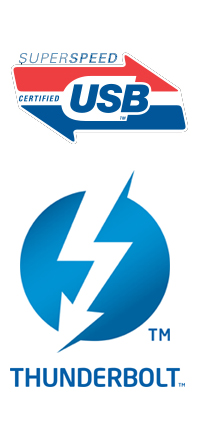The Promise of USB 3.0 Looks More Certain in 2012
USB 3.0 or SuperSpeed USB as it is often referred to has gotten off to a bit of a sluggish start but the announcement this week by the USB Implementers Forum that Intel’s new “Ivy Bridge” 7 Series Chipset has achieved USB 3.0 certification is likely give it a real shot in the arm in 2012.
Superspeed USB has been so named because it delivers a 10 fold increase in data transfer speeds compared to the current USB 2.0 standard but to achieve these speeds everything from the PC, to the cable to the peripheral or storage device connected to the PC must support the USB 3.0 standard.
Whilst we’ve seen a number of smaller PC manufacturers launch PC’s with USB 3.0 on-board the lack of any Intel based
solution has held the market back. The market needs Intel to deliver 3.0 support to drive competition and to bring USB 3.0 prices down.
Some sceptics have also suggested that the Intel has been dragging its heels to allow its own high-speed connection technology called Thunderbolt to get established. Thunderbolt is twice as fast of USB 3.0 and is a joint development with Apple on whose products it is already being shipped.
Mainstream PC’s with Intel’s Ivy Bridge chips onboard and support for Superspeed USB 3.0 are expected to start hitting the shops in May/June 2012. From this point on things will start to get interesting because all of a sudden USB 3.0 will be within reach of most people buying a PC, in fact within a few months it will be the de facto standard on any PC purchased.
With Intel’s support in 2012, USB 3.0 will move into the mainstream and the peripherals and cables that we use with our PC’s will also start to move over to the new Superspeed standard. It won’t happen overnight because un the short term USB 3.0 products will inevitably carry a price premium but within a couple of years USB 3.0 will just be the expected standard and referred to not as USB 3.0 but USB.
For the Promotional USB Flash Drive sector there is unlikely mass change to USB 3.0 flash drives simply because in the short term (next 12-18 mths) they will carry a price premium that most companies won’t want to pay for a “give-away” product. Equally, there is little point paying for a premium high-speed product until you are sure that most people you give them to are able to benefit from the higher speeds on offer. We’re some years away from the ubiquitous use of USB 3.0 and until that time or until the factories stop manufacturing USB 2.0 sticks the standard for promotional USB flash drives will be USB 2.0 – after all, these will still work on USB 3.0 PC’s they just won’t work at the high data transfer speeds.

